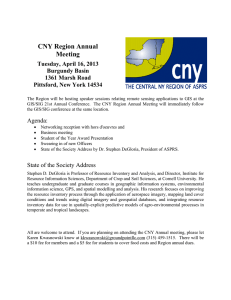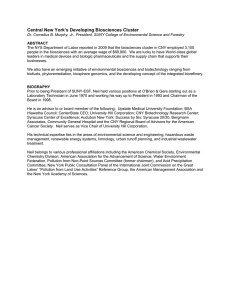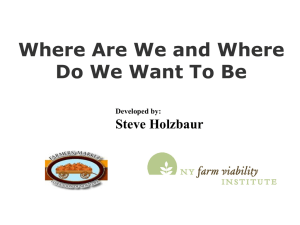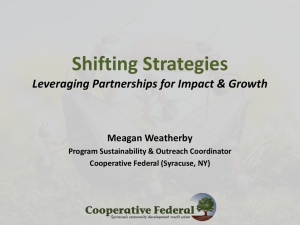Becca B.R. Jablonski July 2011
advertisement
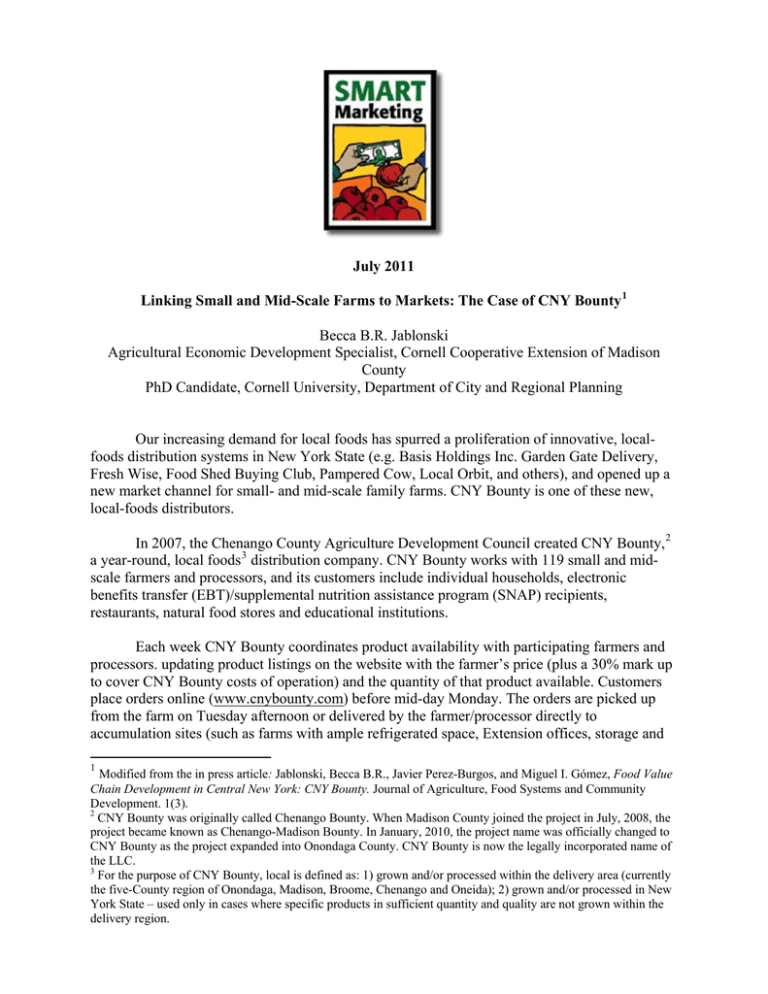
July 2011 Linking Small and Mid-Scale Farms to Markets: The Case of CNY Bounty 1 Becca B.R. Jablonski Agricultural Economic Development Specialist, Cornell Cooperative Extension of Madison County PhD Candidate, Cornell University, Department of City and Regional Planning Our increasing demand for local foods has spurred a proliferation of innovative, localfoods distribution systems in New York State (e.g. Basis Holdings Inc. Garden Gate Delivery, Fresh Wise, Food Shed Buying Club, Pampered Cow, Local Orbit, and others), and opened up a new market channel for small- and mid-scale family farms. CNY Bounty is one of these new, local-foods distributors. In 2007, the Chenango County Agriculture Development Council created CNY Bounty, 2 a year-round, local foods 3 distribution company. CNY Bounty works with 119 small and midscale farmers and processors, and its customers include individual households, electronic benefits transfer (EBT)/supplemental nutrition assistance program (SNAP) recipients, restaurants, natural food stores and educational institutions. Each week CNY Bounty coordinates product availability with participating farmers and processors. updating product listings on the website with the farmer’s price (plus a 30% mark up to cover CNY Bounty costs of operation) and the quantity of that product available. Customers place orders online (www.cnybounty.com) before mid-day Monday. The orders are picked up from the farm on Tuesday afternoon or delivered by the farmer/processor directly to accumulation sites (such as farms with ample refrigerated space, Extension offices, storage and 1 Modified from the in press article: Jablonski, Becca B.R., Javier Perez-Burgos, and Miguel I. Gómez, Food Value Chain Development in Central New York: CNY Bounty. Journal of Agriculture, Food Systems and Community Development. 1(3). 2 CNY Bounty was originally called Chenango Bounty. When Madison County joined the project in July, 2008, the project became known as Chenango-Madison Bounty. In January, 2010, the project name was officially changed to CNY Bounty as the project expanded into Onondaga County. CNY Bounty is now the legally incorporated name of the LLC. 3 For the purpose of CNY Bounty, local is defined as: 1) grown and/or processed within the delivery area (currently the five-County region of Onondaga, Madison, Broome, Chenango and Oneida); 2) grown and/or processed in New York State – used only in cases where specific products in sufficient quantity and quality are not grown within the delivery region. processing facilities) where warehouse workers pack the orders that evening. Fragile or perishable items may be harvested (or made), packed, and distributed on the same day. Orders are either delivered directly to customers’ homes or delivered to one of CNY Bounty’s 18-drop sites. Organizational Structure Until January 1, 2011, CNY Bounty operated under the umbrellas of Cornell Cooperative Extension of Chenango and Madison Counties. The transition to an independent entity was difficult due in part to the ambiguity about who should own the business. The large number of vendors with whom CNY Bounty works (particularly the large number of beginning/expanding farmers), as well as the fact that CNY Bounty targets low-income customers (CNY Bounty’s labor costs almost double when customers pay with EBT/SNAP benefits), precipitated the CNY Bounty Board of Directors decision to form a 501c3 not-for-profit corporation and an LLC forprofit corporation. The 501c3 is the sole member/owner of the LLC. The majority of operations take place under the LLC, and the 501c3 is used for not-for-profit activities like supporting small/beginning farmers with invoicing, packaging, and quality control, as well as reaching out to low-income customers and underserved communities. While the LLC must self-finance its operations, the 501c3 relies on grant funds and private donations. Growth As of January 1, 2011, CNY Bounty completed over 11,000 deliveries. These deliveries represent sales of over one-half million dollars, of which over $400,000 was returned to participating farmers and processors. Between 2008 and 2010, the average number of weekly orders increased from 26.4 to 126.5, average weekly sales increased from $1,525 to $5,530, and average revenue returned to members increased practically four-fold. These figures are small, but suggest increased future sales. In August 2010, CNY Bounty started developing an institutional sales channel, which has since resulted in over $2,000/week in average sales. Challenges In February 2011, CNY Bounty decided to take a temporary break from home delivery in order to restructure (although it continued with its wholesale distribution business, working with a subset of participating producers). CNY Bounty began with a $25,000 grant from the NY Farm Viability Institute (NYFVI), matched by a Chenango County grant. In addition, CNY Bounty has received foundational support, although generally for specific outreach activities. CNY Bounty is not yet a “bankable business” and thus has never been appropriately capitalized. This inability to obtain working capital has had significant repercussions. Perhaps most significantly, CNY Bounty’s inability to upgrade its website has led to cash flow issues resulting from the inability to accept credit card payments. CNY Bounty’s vehicles are also very used and in constant need of repair – resulting in over $1,000/month plus frequent towing. In addition, though a worthy goal, it is much more expensive to work with small and midsized farmers, beginning farmers, Amish farmers with whom it is not always to communicate and get products, and farmers who are in the process of expanding. CNY Bounty hired additional staff to work with farmers on invoicing, quality control, and packaging – labor costs that were not accounted for in its original business plan. Next Steps CNY Bounty hopes to reopen its doors for home delivery in time for the upcoming school year, although it will look much different. CNY Bounty is teaming up with the Upstate Growers and Packers (a farmer-owned cooperative comprised of medium and large-scale vegetable growers), the New York Beef Farmers Cooperative and the Central New York Regional Market to form a regional food hub focused on aggregating and distributing products grown and processed by farmers in Central New York. CNY Bounty has found wholesale distribution to be far more efficient and profitable than home delivery, and thus emphasis will be placed on expanding farm-to-institution sales, although home delivery will continue. In addition, where additional labor is needed to work with small/beginning/expanding farms and low-income consumers, outside funding will need to be raised through the not-for-profit organization. “Smart Marketing” is a marketing newsletter for extension publication in local newsletters and for placement in local media. It reviews elements critical to successful marketing in the food and agricultural industry. Please cite or acknowledge when using this material. Past articles are available at http://marketingpwt.aem.cornell.edu/publications.html.
